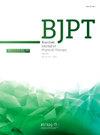Developmental coordination disorder and executive function deficits: Implications for emotional, mental, and overall well-being
IF 3.2
3区 医学
Q1 ORTHOPEDICS
引用次数: 0
Abstract
Background
Developmental coordination disorder (DCD) has been found to be associated with executive function (EF) deficits, and to negatively impact emotional (self-esteem, self-efficacy), mental, and overall well-being. Previous research has largely focused on EF deficits in children with DCD, with limited examination of adults, particularly in relation to the effect of co-occurring EF deficits on various well-being aspects.
Objectives
To investigate (1) the frequency of EF deficits in adults with DCD, and (2) whether the co-occurrence of DCD and EF deficits contributes to emotional, mental, and overall well-being.
Methods
Fifty-five adults with DCD, without hyperactive attention deficit disorder (mean age = 27.57 years, 49.1 % male), underwent a test battery to assess fulfillment of the DSM-5 criteria for DCD. They completed norm-referenced measures of everyday EF-related difficulties, as well as self-report questionnaires measuring emotional, mental, and overall well-being.
Results
Almost 50 % of the adults with DCD exhibited EF deficits, manifested mostly by 'cold' (non-emotion-related) difficulties in task monitoring, planning, and organizing, and working memory. Compared to participants with DCD alone, participants with co-occurring DCD and EF deficits had significantly (p < 0.05) lower emotional, mental, and overall well-being, manifested by lower self-esteem, general self-efficacy, and life satisfaction and higher psychological distress.
Conclusions
EF deficits, particularly in 'cold' domains, are highly prevalent among individuals with DCD, substantially affecting their emotional, mental, and overall well-being. The results highlight the need for a comprehensive evaluation of EF by healthcare professionals to ensure interventions address both motor and potential cognitive challenges, supporting improved well-being.
发展性协调障碍和执行功能缺陷:对情绪、精神和整体健康的影响
发展协调障碍(DCD)已被发现与执行功能(EF)缺陷有关,并对情绪(自尊、自我效能)、精神和整体健康产生负面影响。以前的研究主要集中在患有DCD的儿童的EF缺陷上,对成人的检查有限,特别是在共同发生的EF缺陷对各个健康方面的影响方面。目的探讨:(1)成人DCD患者EF缺陷的频率,(2)DCD和EF缺陷的共同发生是否有助于情绪、精神和整体健康。方法55例无多动症的DCD成人患者(平均年龄27.57岁,49.1%为男性)接受了一系列测试,以评估DCD的DSM-5标准的实现情况。他们完成了日常ef相关困难的标准参考测量,以及测量情绪、精神和整体幸福感的自我报告问卷。结果近50%的成年DCD患者表现出EF缺陷,主要表现为任务监控、计划、组织和工作记忆方面的“冷”(非情绪相关)困难。与单独存在DCD的参与者相比,同时存在DCD和EF缺陷的参与者的情绪、精神和整体幸福感显著降低(p < 0.05),表现为自尊、一般自我效能和生活满意度较低,心理困扰较高。sef缺陷,特别是在“冷”域,在DCD患者中非常普遍,严重影响他们的情绪、精神和整体健康。研究结果强调,医疗保健专业人员需要对EF进行全面评估,以确保干预措施能够解决运动和潜在的认知挑战,从而支持改善健康状况。
本文章由计算机程序翻译,如有差异,请以英文原文为准。
求助全文
约1分钟内获得全文
求助全文
来源期刊
CiteScore
6.10
自引率
8.80%
发文量
53
审稿时长
74 days
期刊介绍:
The Brazilian Journal of Physical Therapy (BJPT) is the official publication of the Brazilian Society of Physical Therapy Research and Graduate Studies (ABRAPG-Ft). It publishes original research articles on topics related to the areas of physical therapy and rehabilitation sciences, including clinical, basic or applied studies on the assessment, prevention, and treatment of movement disorders.

 求助内容:
求助内容: 应助结果提醒方式:
应助结果提醒方式:


